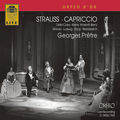ORFEO International – Reviews
Important Releases Briefly Introduced
June 2008
ORFEO 2 CD C 734 082 I
With its new production of Capriccio on 7 June 2008, the Vienna State Opera is reviving a long-standing tradition in a house where the onstage debate over the relative merits of the words or the music in opera has always been conducted between the finest representatives of their profession. The work was first staged in Salzburg in 1950 in a production subsequently seen in Vienna. Both here and in Salzburg, the Countess was for many years sung by Lisa Della Casa in one of the Strauss roles with which she was most closely associated. The present live recording from 1964 is the first official record of this altogether ideal interpretation. The conductor is Georges Prêtre, who was also in charge of the 2008 New Year’s Day Concert from Vienna. 
C 734 082 IAs long ago as 1964 he was already demonstrating his Strauss credentials over and above his affinities with the Viennese Waltz King and his dynasty. It virtually goes without saying that the singers who were engaged to appear with Lisa Della Casa were in every way her equals. Her difficulty in choosing between poetry and music becomes all the more understandable when the representatives of these two art forms are artists of the stature of Waldemar Kmentt and Walter Berry. Both men were among the company’s leading singing actors during the second half of the 20th century, bringing to their present parts both striking vocalism and an impassioned wooing of the woman on whom they have set their hearts. As we might expect, Berry also cuts an impressive figure when declaiming the sonnet that undergoes several transformations in the course of the opera. No less impressive is the American baritone Robert Kerns, whom Herbert von Karajan had invited to join the Vienna State Opera ensemble two years previously and who remained with the company until his premature death at the age of fifty-five in 1989. As the Count he displays all his natural charm in his attempts to win the hand of Christa Ludwig’s imposing Clairon. Otto Wiener was more of a heroic baritone than either Berry or Kerns, allowing him to bring all the necessary authority to the role of the theatre manager La Roche and to his great address. Last but not least are the two „Italian“ singers, whom it would be difficult to imagine better cast today: the young Lucia Popp and Fritz Wunderlich turn Strauss’s witty parody of Italian bel canto singing into a serious highlight of the work, presenting us with an altogether classic example of this particular vocal style.
top |